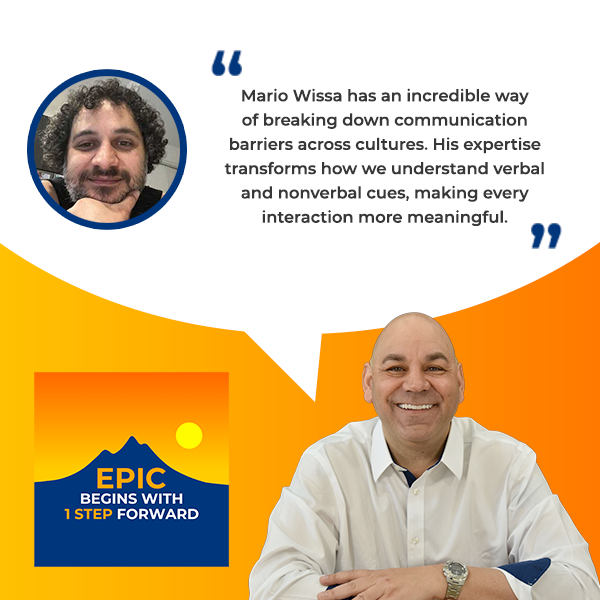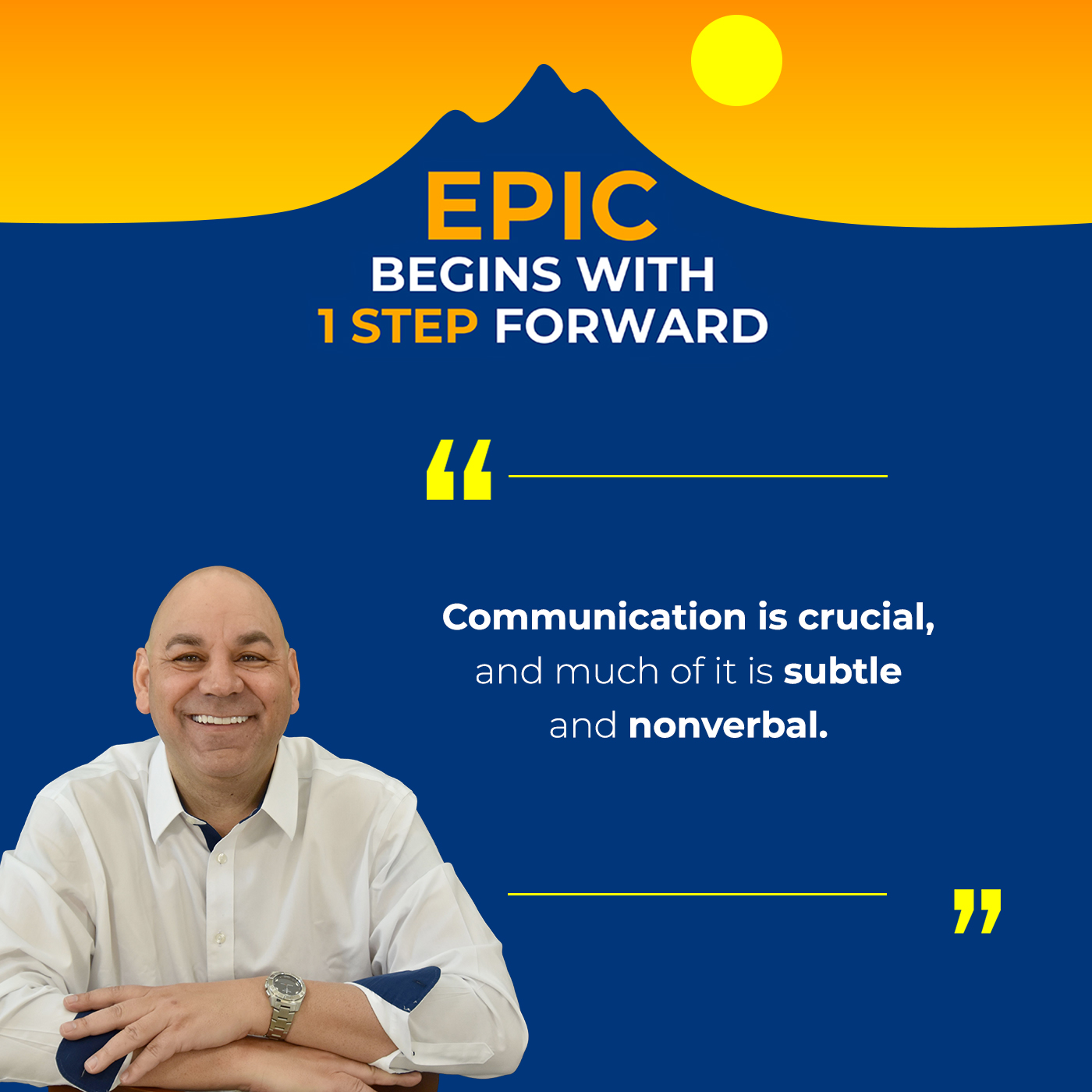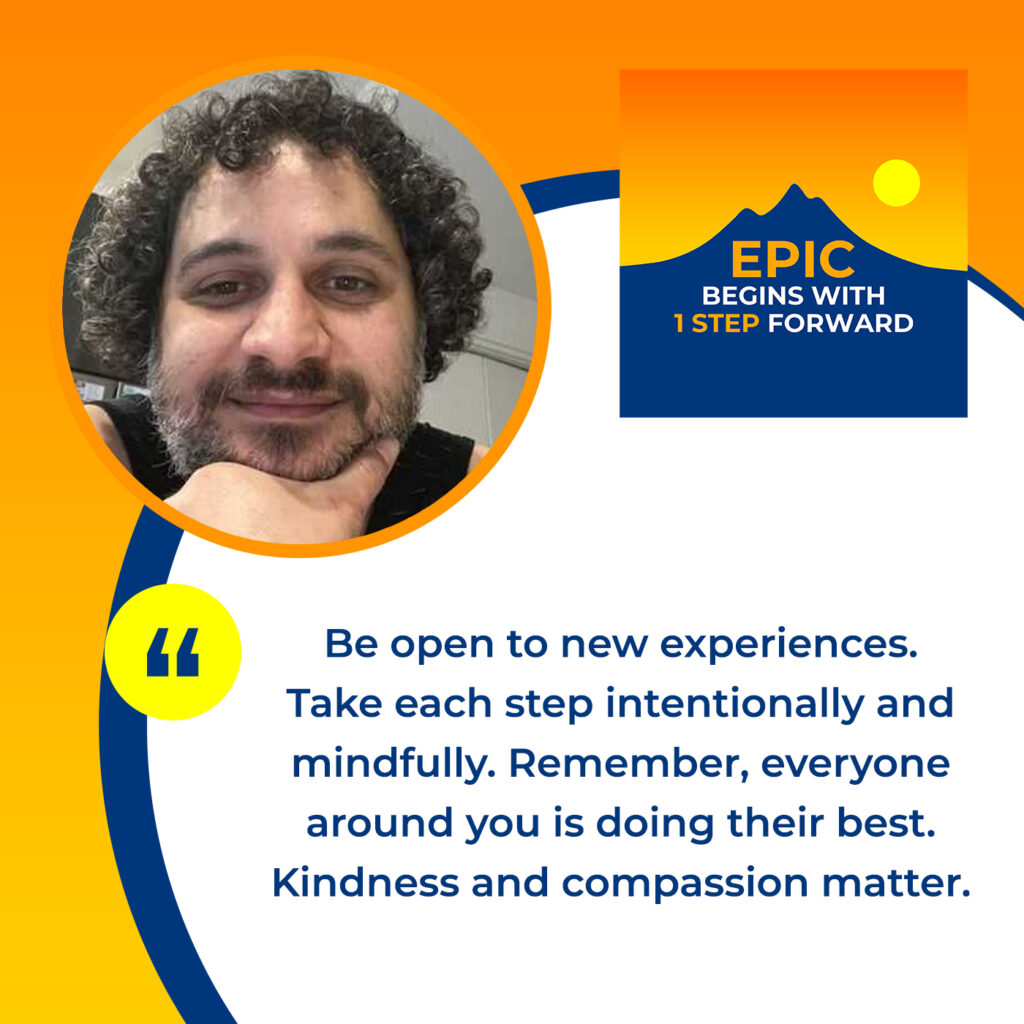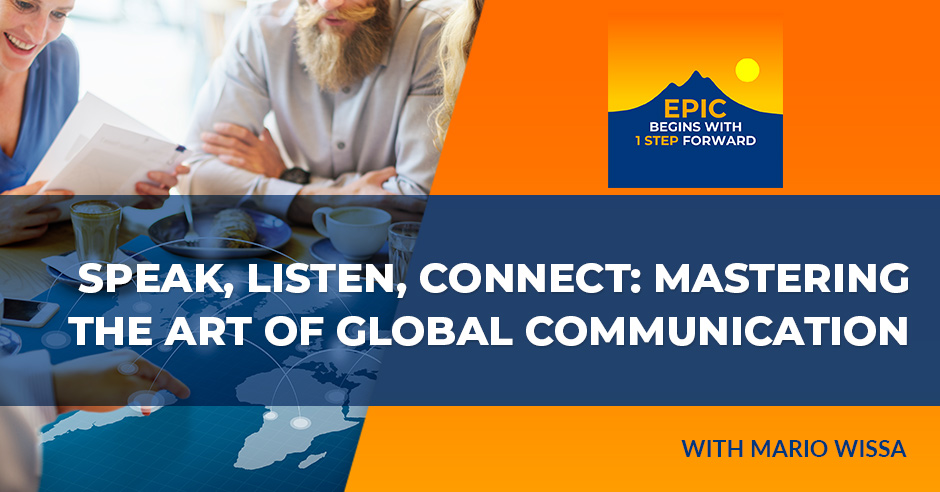#EPICBeginswith1StepForward #ZanderSprague #GlobalCommunication #CulturalAwareness #NonVerbalCues
—
Watch the episode here
Listen to the podcast here
Speak, Listen, Connect: Mastering The Art Of Global Communication With Mario Wissa
In this episode, I am honored to be joined by Mario Wissa. Mario, tell us who you are and what you do.
I am many things but for the sake of this show, my name is Mario Halim Wissa. I’m a communication researcher, author, and speaker. I spread the good word about communication and how it is an incredible, invisible power that we use on a daily basis, consciously or unconsciously.
The Power Of Nonverbal Communication Across Cultures
Communication is so important and so much of communication is subtle and nonverbal. It sounds like, from reading your bio, you know a little bit about that. You’ve traveled extensively and studied many different cultures, languages, and how communication happens. What would you say is the biggest difference, let’s say, between American nonverbal communication and perhaps over in Asia?
In Asia, especially in India, the hands and the head is everywhere. In Egypt, not so much. They tend to put it behind them. That’s a sign of respect. Even though for us in the US, it might mean that you’re hiding something. Also, a very important nonverbal cue that I paid attention to is the eye contact and the position that we sit in. The eye contact varies so much in culture, especially between generations.
In the US, eye contact means I am tuned in, you’re tuned in, and we’re in this together. In different cultures like Egypt, India, or Bali, you’re not supposed to look in the eye of someone who’s older than you. It’s a sign of disrespect, which is baffling to me. The second thing with nonverbal cues is the way we sit down. Believe it or not, if you have someone older than you and they’re speaking, you cannot sit down unless they’re sitting down. You only move around if they allow you to.

The older person holds the vibe of the environment and we’re supposed to lead with that. For me personally, in the US, the idea is a little bit more liberating. It’s not an age or decision. It’s more about your position and what passion you put out in the position that gives you the power. That’s a simple distinction. I’m happy to go deeper.
Many years ago, I worked at Intel. One of the classes I got to take, which was fascinating because I work with a worldwide team. It was called Global Communications. I wish more people would have this because they were talking about how different cultures communicate. For example, they were talking about people from Israel, who tend to be incredibly direct. In the United States, we take it that they’re angry or whatnot, and they’re not. They’re simply just talking to you very directly. They’re not mincing words.
That was helpful because I had some colleagues I worked with who were in Tel Aviv. When I talked to them, I was like, “He always sounds so angry. What’s he angry about? I thought we were agreeing.” They talked about the Indians shaking their head. If you see that, they’re not agreeing with you. They may do what you’ve asked or they may not. For example, in China or Japan, silence is not necessarily a bad thing. It can be a sign of respect. They’re not going to come out and go, “There’s no way I’m doing that for you.” They will be quiet and that’s your clue that that’s not working.
As a mental health professional, I’m fascinated by nonverbal communication. When I’m doing counseling, I’m paying close attention to your nonverbal or body cues about what’s going on. Your words may say, “Zander, everything is fine.” Yet you’re all closed up. I’m fascinated that you’ve taken it upon yourself to study communication because you’re right. There’s no way that we’re going to even scratch the surface but it’s fascinating what you learn.
That is so true. You brought something that I had to take down some notes so I could bring it up. In my experience, I was able to make sense of it when I went to visit Egypt. If someone is assertive and concise about their message, and their message and sentence are trimmed and direct, I used to think those people are difficult. Honestly, they’re A-holes.
Studying communication, getting involved in the corporate world, and getting higher education and more experiences, I became that and was not aware of it until I went a couple of years ago to visit Egypt. I see how I was very assertive, direct, and straightforward in a compassionate, loving way. Yet most people around me remind me of how I used to behave before, not direct, not with much confidence, and not very assertive. I was like, “Maybe. We could. Probably.” All these languages. The environment shapes us even when we are not aware of it.
Navigating Cultural Surprises And Unexpected Experiences
The communication in the words that we use and stuff like that, whether it’s an individual society like in the United States or a collective society. I’ll call it the Asian model to paint a broad swath there. You’re clearly on an epic journey and then you came to the United States. I’m always fascinated to find out. I’m taking a little detour here, Mario. I got a question but I came up with a new one. What were 1 or 2 of the things when you first arrived in the US that were most surprising to you?
I’m going to give you two from the environment perspective and another two from the social interactive community. The first two are simple, cleanliness and people follow traffic lights. It’s not Christmas decorations. From communication and social interaction, there is a different flavor of niceness in the American culture, even coming from Egypt. A simple smile and simple hi or hello. It doesn’t have to go anywhere after that. Only a simple interaction.
The environment shapes us even when we are not aware of it.
People sometimes have to schedule times to meet up. Scheduling time by putting something on the calendar is a very business mentality in Egypt. Here, we’re doing a Halloween party. Let me pull the calendar and add this time. “You’re going on that trip. Which day? Let me see if I’m open on that calendar.” It’s a little too corporate, yet it’s effective in the long run.
The first thing you said was cleanliness. I’ve been fortunate to travel to many places in the world and to school and work with people from different countries and hygiene standards are different. I’ll leave it at that because they’re different. Perhaps Americans are a little more obsessed about showering, wearing deodorant, and stuff. In other places, not so much. I get that. It’s not right or wrong.
The story I wanted to tell you is I asked a friend of mine who had emigrated from Russia. I love to ask people who were not born in the US, like, what was it like? He said that for him and his wife when they first arrived, they had an apartment. They had to go to the supermarket to buy basic stuff like salt, pepper, toilet paper, milk, butter, eggs, and all of that.
They walked into the supermarket and he told me that, first of all, they were overwhelmed because they had never in their wildest dreams imagined there’d be a store with so much. His wife started to cry. She couldn’t believe that there were shells that were full. He’s like, “It took us three hours and we honestly bought maybe 25 things. I never had more than one choice for butter, milk, toilet paper, salt, or pepper.” He’s going down the spice aisle and he’s like, “How do I know salt to salt? How am I choosing which one I want? How do I choose which toilet paper is right?”
I’d love to ask people who have emigrated, what was it like? What did you think? What was the reality? As I said, I’ve been fortunate to go to different countries. There are things that I thought would be one way and they aren’t. There are other things. You talked about obeying stoplights. I have traveled in many countries where I come up with a strategy as I’m riding in a car and that is to look down at the horizon. If I concentrate on what’s in front of me because of the way different countries drive, there’s only so many times I am shocked before I pass out.
I have a strong urge to tell you a joke but I’ll try to make it short. Can I? Would you allow me?
I love a good joke.
There’s this American dude who went to Egypt to visit for the first time. He got picked up from the airport by a professional taxi driver. As the taxi driver is driving down the road, he comes across a red light. He does not even slow down and goes through the red light. The passenger in the back or the American guy was like, “It’s red.” The driver said, “Don’t worry. I am professional.”

He did that at the second and third red light and kept going through until he got to a green light then the driver stopped. The passenger in the back was baffled like, “What is going on? It’s a green light.” The driver said, “Sir, just in case, there is a professional coming from the other side.” I love this joke. It’s a different culture.
I have not yet traveled to Egypt but my understanding is car horns are used often.
It’s not used more than it’s used. I kid you not. That’s something else after being gone for many years and to go back and visit Egypt with those horns.
You couldn’t sleep because you’re like, “The cacophony.”
For real. I don’t go out that much. Using earplugs is amazing. You think living for many years in this environment will be normal for me but no. Time passes by. The mind, expectations, the nervous system evolves, and our responses evolve.
It’s always interesting to talk to people and go, “What did you think? What was the reality and the shocking things?” I hear two things. One is Americans are rude. If you don’t speak English, we talk to you louder because we think if we talk to you louder, you’re going to understand us somehow. I haven’t noticed anyone who doesn’t speak English go, “I’m going to speak French at you louder so that you understand me.” My observation is Americans are very friendly. Most people want to get to know you. That’s not true 100%. That’s true of any country. In general, we’re like, “This is interesting. Who are you?” We’re curious. What has been your experience as you’ve traveled around in terms of people’s natural curiosity or multi-cultural curiosity?
The Importance Of Openness To New Cultural Experiences
It is interesting. When I was told before I started traveling Asia in 2017, I was told, “No matter what local clothes you put on and how you try to hide, something about you will always show that you are not from here. You’re from India or Bali.” In these places, you realize that you are a celebrity without wanting to be one. Honestly, it’s scary and overwhelming. People want to take pictures. Some people are begging. Some people want to ask you, “Which country you’re from?” Some of them want to practice English with you.
Keeping an open mind is important because even though it’s overwhelming at the beginning. Humans are curious. We do struggle with this. If someone’s curious about something about us, we feel like they’re nosy but they’re genuinely curious. They don’t see foreigners every day with sandals and socks. That’s only on TV. They see that in person. Be open to new experiences. It’s like you say. Take one step forward and take it intentionally and mindfully. Be aware that we’re surrounded by other humans who are simply doing their best. Being kind and compassionate is very important.
One of the things that I’ve discovered in traveling is that sometimes, the hardest communication is in other English-speaking countries because there are subtle societal differences. If I’m in China, for example, I’m aware that there are big differences in some ways easier. I took a semester at university and studied in Australia. They speak English but there are subtle things. There are colloquial sayings that I don’t know.
Time passes. The mind, expectations, and nervous system evolve, as do our responses.
My first experience was when I was standing in a queue. I learned that was a line but I was in the queue. This woman asked, “Are you right?” I’m like, “No, I’m left-handed. What does that have to do with the stamp that I want to buy? Am I somehow being left-handed going to be ostracized or something?” All it meant was, “Have you been helped? Are you right?” I’m standing there, utterly confused.
It’s not that I didn’t understand the word. I just didn’t understand the word as it was being used. I’m like, “Can I get a stamp?” “Yes, no problem.” This went on and I was trying to figure it out. I’m a smart man. I can figure stuff out but I’ve got no cultural context. Cultural context can be so helpful. I didn’t understand as I was meeting people what the norm is. Is it okay for me to say to people who are in my class, “Let’s go get a cup of coffee?” Is that too formal? Are there things that have to happen in a certain way? I didn’t know.
That’s why I say sometimes going into a country that speaks your language is different, even in the United States. Different parts of the United States have different accents, things have different meanings, and different words are used for the same thing. My older sister went to college in New Orleans. She said, “I have to go make groceries.” I’m like, “Are you making a bag of flour? I don’t understand.” She goes, “No. That’s what we call going to the store. I got to go make groceries.” You’re laughing because you probably have encountered some of that.
Honestly, I’m trying hard not to interrupt you and share. It’s so funny. There’s one in Bali. If I’m giving you medicine, I’ll just tell you, “Take these.” They always say when they give you a medicine, “Now, consume.” I’m a consumer in the US but I’m not sure if I’m going to be a consumer here too. The second one was when I first moved to the US.
My English was basic. I was seventeen years of age. I went to the grocery store with my brother. The cashier lady simply looked at me and she said, “What’s up?” What do I do? I look up at the ceiling and look for what’s up. My brother and the cashier lady lost it. “I’m a clueless kid in the middle. Explain it to me.” It’s small little things like that. Cultural language.
Another experience I had was when I was going to Tasmania to travel. I met this woman on the plane and I’m talking to her. She’s like, “If you get over here, give me a call.” I had her name and number. I was traveling around. I went out to believe it was Nelson State Park. I’m staying in a bed and breakfast. I come down one morning and the innkeeper was like, “You’re Zander.” I’m like, “Yeah.” She goes, “You’re in trouble.” I’m like, “What did I do?”
Australia is a rather small country. It’s the size of the US but only has seventeen million people. Perhaps I’m a little distinctive, I don’t know, but that woman who I’d met on the plane lived about 2 miles away and someone had been talking about this American and said, “He’s got a great name. His name is Zander.” There can only be one American Zander.
She was hurt that I hadn’t called her. She would offer me a place to stay but I hadn’t connected because I was traveling around. I hadn’t looked at a map. I called her up and said, “Look, I am sorry. I did not mean any offense. I honestly was not putting two and two together.” I encountered that in Australia. If someone meets you and says, “Look me up,” they’re serious. They will be offended if you don’t.

In Australia. Not in Egypt. We have this thing, we call it sailors offer. You’re on the shore in the middle of the water and say, “Come on over. It’s impossible but I’m inviting you.”
“I get the credit for inviting you but I didn’t expect you to show up.”
Assertiveness. That’s an example of what I was talking about. Instead of saying, “Sorry, I cannot do it. I’m engaged. Yet I would love to maybe schedule something in a day or two or a week.” They don’t have the ability to do that.
The Difficulty Of Communicating Through Text
Nonverbal cues are so important when we’re communicating. One of the things that I’ve noticed, and I’m going to sound old here for a moment, Mario, is the younger people and their obsession with typing everything they want to do. They’re texting and posting. As a mental health professional, I did my internship at the school base. I was in high school and middle school. I said, “You have to talk to people.”
The problem with texting is I can’t understand what you’re saying. It’s up to me to interpret whether you’re angry or joking with me. I’ll use the words shut up. If I said to you, “Shut up, Mario.” You get from my tonality that I want you to be quiet but if I’m like, “Shut up.” You understand I’m not telling you to be quiet. It’s a disbelief. You don’t get that in a text. If you try and put that in a text, there are five lines going, “I’m kidding here.”
Drop down the menu, try to choose the right emoji, and then click on the wrong emoji. You have to delete it.
You write something and then someone’s all upset. They’re getting upset and they give you all caps back. What the heck? What happened to this communication? I’m a talker, not a typer. I will pick up the phone 9 times out of 10 because I find that synchronous conversations versus asynchronous are so much faster, more efficient, and get to the point. My time is valuable. I started working with a telehealth company to do mental health. They asked me if I was open to doing therapy over chat. I said, “Absolutely not.”
I can answer that for you.
For two reasons. I’m a talker and not a typer, but more importantly, if I can’t see you and all we’re doing is texting, I don’t know how I’d effectively do any therapy. I have no idea what you’re telling me and whether, frankly, you’re telling me what you think I want to hear. If I can see you, I can maybe tell that you are upset.
What’s coming up for me I have to bring up because you shared this so wonderfully. You have a deeper perception of the message that’s being set and how it’s being said, the tonality, and the space between each word and letter. Some people are not as tuned in and they take the message for face value. You have the privilege of this deeper perception and awareness. That makes you make an impact in a different way by speaking. I love it.
I have two daughters who don’t necessarily understand that there are things that we need to do. If I’m going to be mean to you in high school, Mario, I had to do it to your face. I couldn’t be anonymous. If I wanted to say something mean to you, I had to say it. Maybe I’ll drop a note or something but that was about as indirect as I might get, versus randomly making a comment and not having to put my name to it.
The passive aggressiveness thing usually shows a lack of happiness.
If you were dating someone and you decided it was not working, you had to learn how to deliver bad news in person versus a text like, “It’s not working out. Bye.”
Don’t forget TTYL, “Talk to you later.”
Also, TTN, talk to you never. In some ways, it’s sad. There’s some communication that’s getting lost or an art of communication and human interaction.
Finding A Better Way To Communicate And Connect
I have a strong urge to bring this up because you started to touch on it. It’s important. I assume what you are sharing with me with your experience is with your teenager daughters. This awareness that you’re bringing up is one of the primary reasons why from a young age, I was looking for a different way to deal with conflict resolution and how to interact with other people.
To be frank with you, the environment that I grew up in had somewhat limited resources, education, societal position, and all that. Even from a young age, part of me always thought that there must be a better way to do this. That’s why I keep studying. Communication was not the first thing I studied. I started Psychology, Anthropology, Accounting, Business, and IT.
Some people are not as tuned in and take a message at face value.
I tried different things until I came across one communication class, and a huge light bulb came on. All of us, especially at young age kids, tuned into what our family dynamic is like and personal relationships are like. We can detect that there might be room for improvement. If that comes up, hang on to it and keep searching for 5 years, 10 years, or 20 years. There’s no turning back from a breakthrough.
I couldn’t agree more, Mario. Mario, this has been so enlightening and so much fun.
You’re so kind.
I want to thank you so much. How can people find you, get ahold of you, or learn more about what you’re doing with communication?
All you have to do is use the flashlight and project the word communication on the sky and I will come up to you. I never said that before. I love this idea. My website, humbly put together by my amazing marketing team, is MarioWissa.com. You can reach out to me. My email is Co*******@********sa.com. You also have the option to book a 30-minute one-on-one session together, charge-free and cost-free. I don’t charge any money for what I’m doing. Life deserves more awesomeness. I’m trying to offer some of that. That’s all.
Mario, thank you so much. I want to remind everyone that if you’re ready to step into your epic, go to EpicBegins.com. As always, remember that epic choices lead to the epic life that you want.
I love it, Zander.
Important Links
About Mario Wissa
 My name is Mario Wissa; I am a social communication expert with a passion for helping individuals and organizations improve their communication skills. As a researcher, author, and public speaker, I’ve dedicated myself over 17 years to studying intrapersonal, interpersonal, and group communication. I’ve authored three books on the subject and have traveled extensively, gaining valuable insights from diverse cultures and intercultural communication.
My name is Mario Wissa; I am a social communication expert with a passion for helping individuals and organizations improve their communication skills. As a researcher, author, and public speaker, I’ve dedicated myself over 17 years to studying intrapersonal, interpersonal, and group communication. I’ve authored three books on the subject and have traveled extensively, gaining valuable insights from diverse cultures and intercultural communication.

